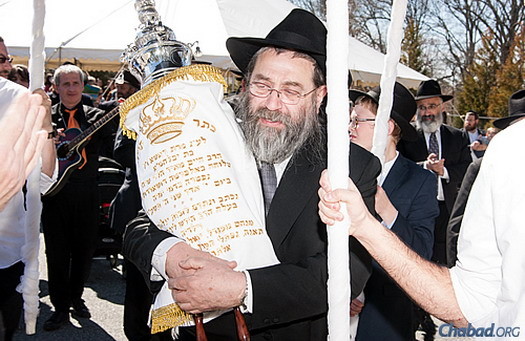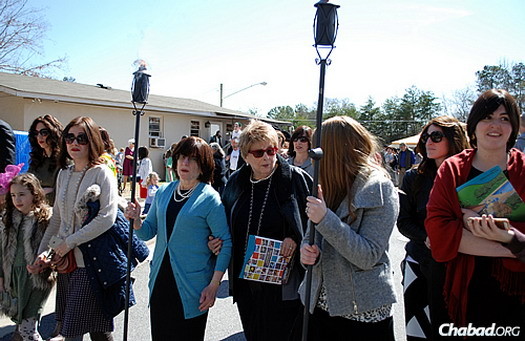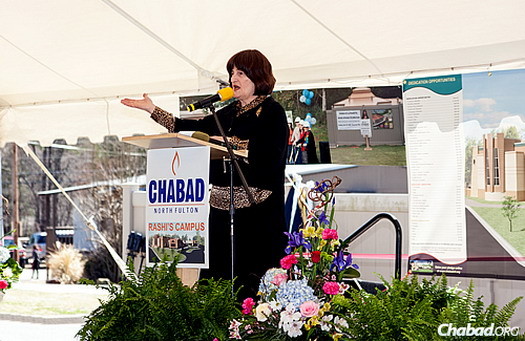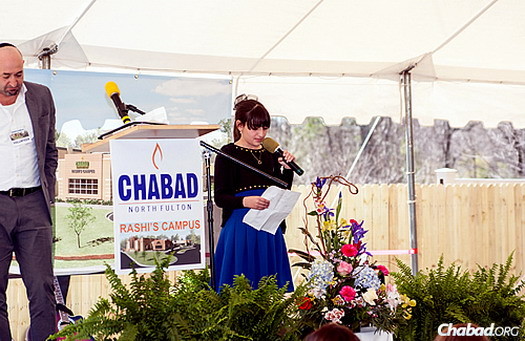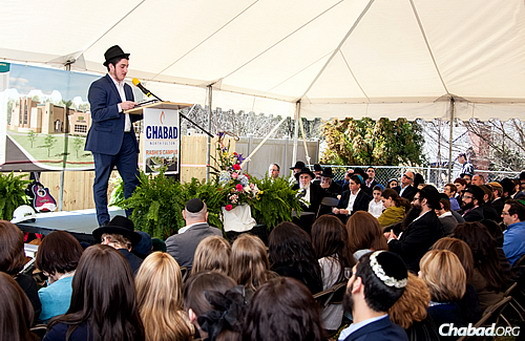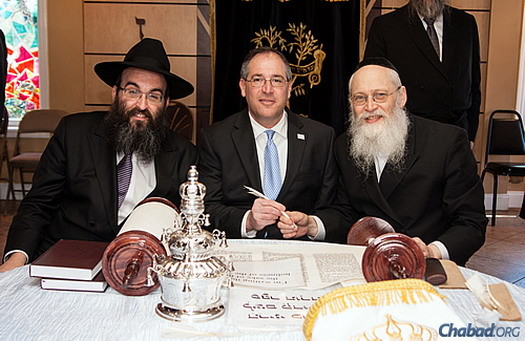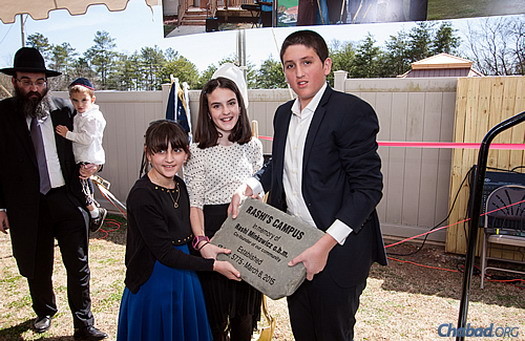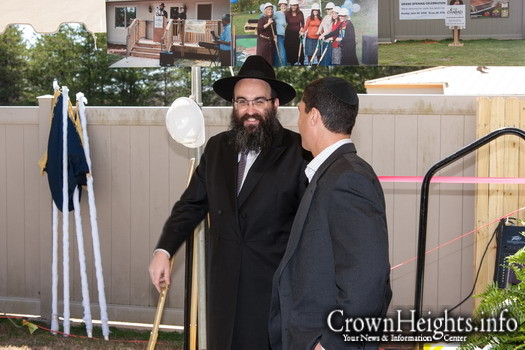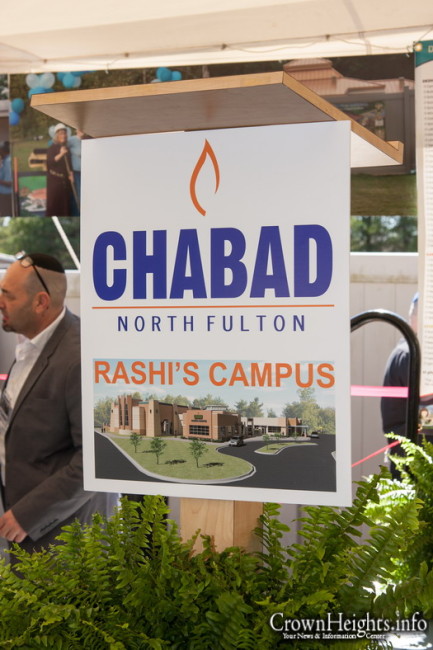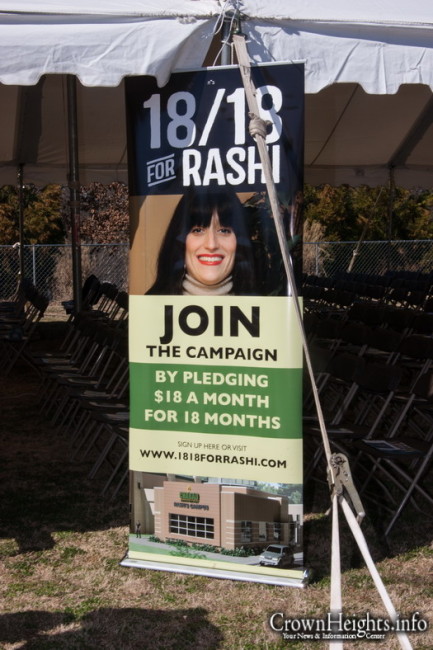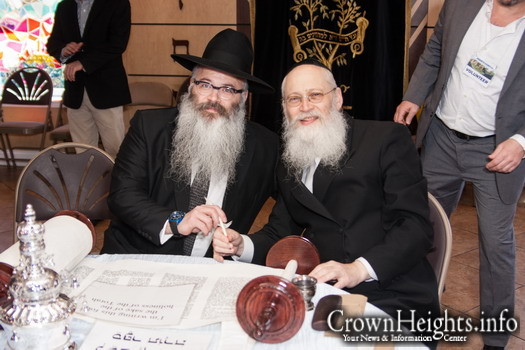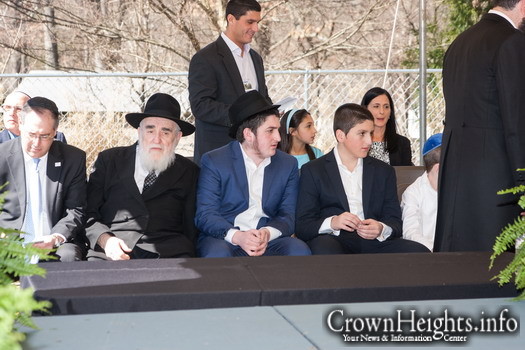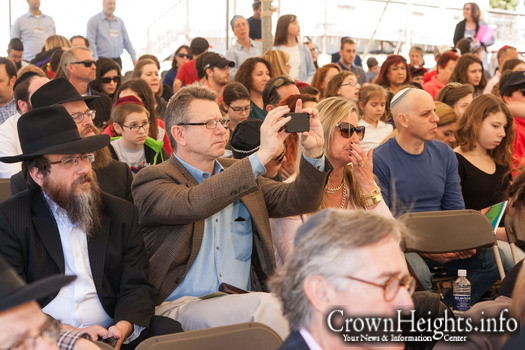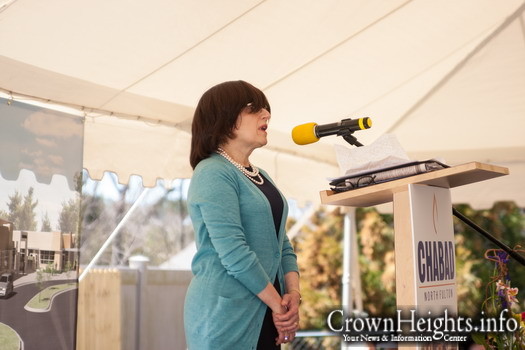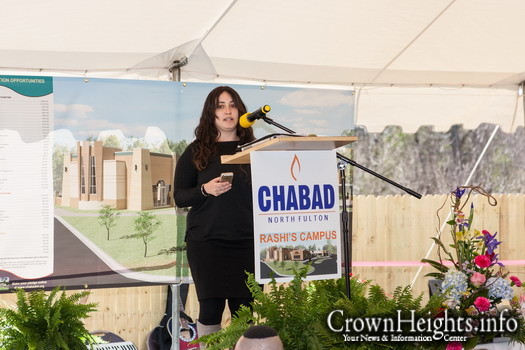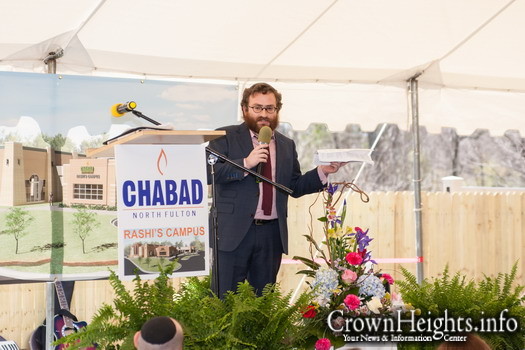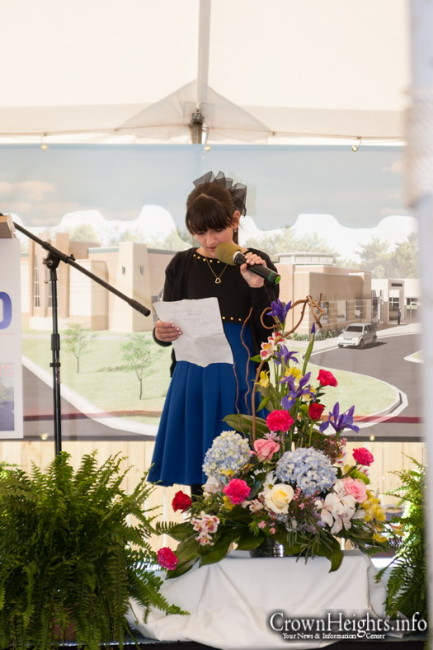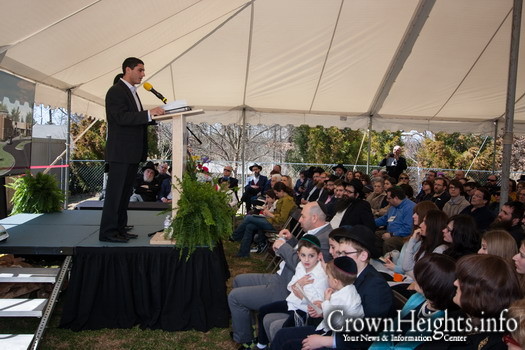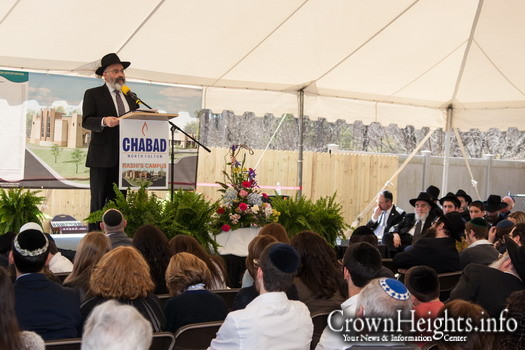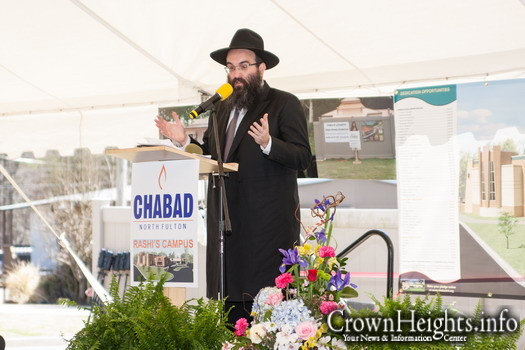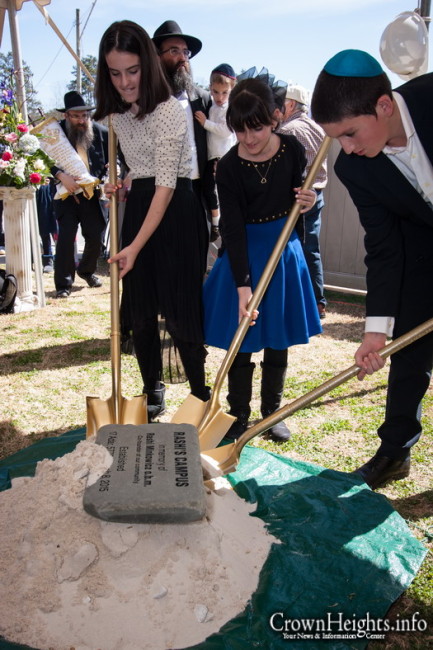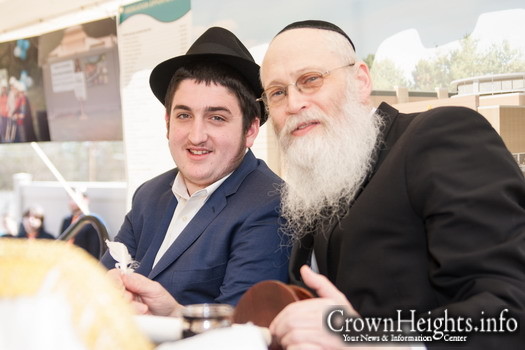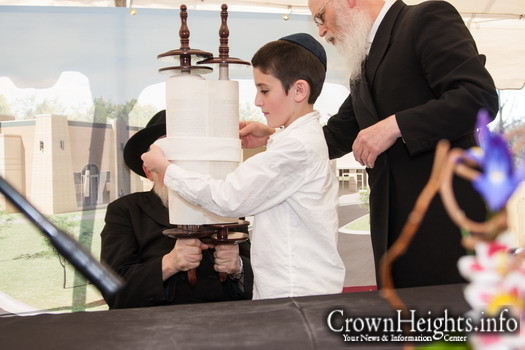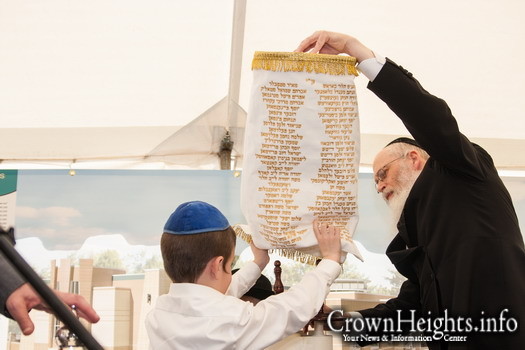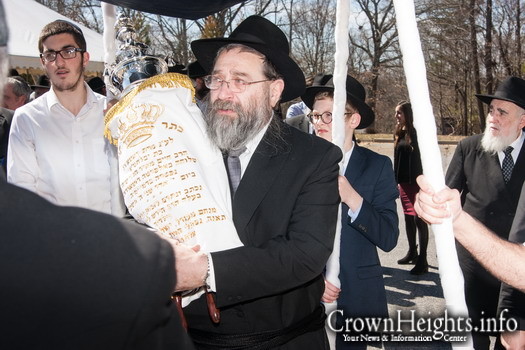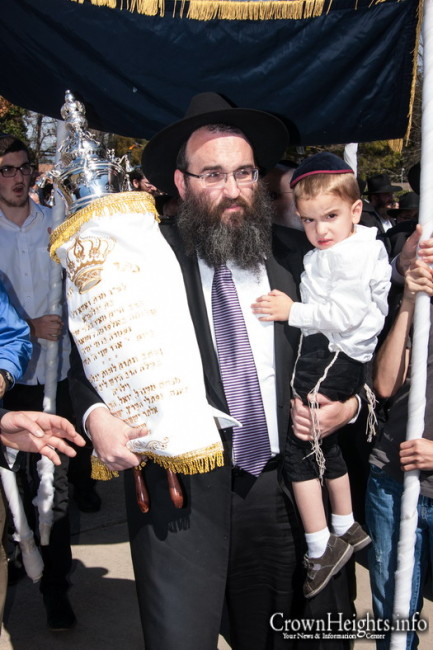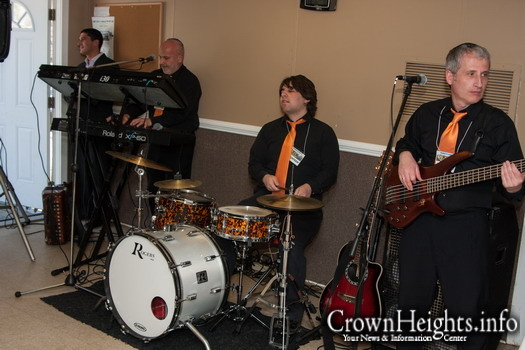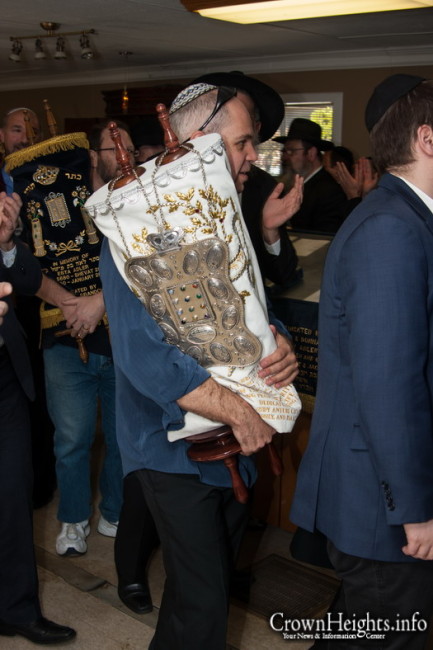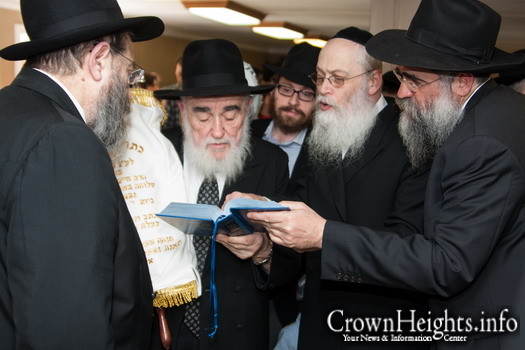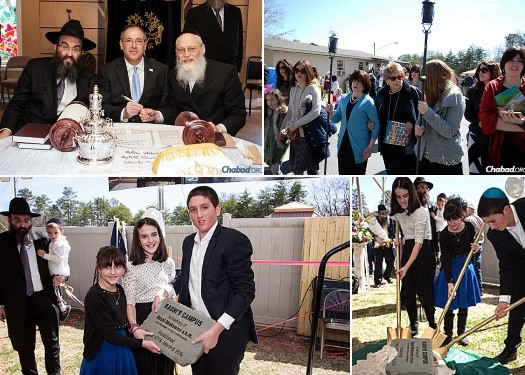
Emotional Day of Events at ‘Rashi’s Campus’
A palpable feeling of Jewish unity emanated from the hundreds of people gathered on Sunday at Chabad of North Fulton in Alpharetta, Ga. Members of the crowd sported black hats and beards, jeans and T-shirts, long sleeves and skirts; in fact, those assembled could be construed as resembling a Torah scroll itself, bringing letters and souls together to form a single Jewish people.
The event in suburban Atlanta marked the first yahrtzeit of Rashi Minkowicz, who passed away last March at the age of 37, leaving behind her husband, Rabbi Hirshy Minkowicz, and their eight children. The day also celebrated the completion of a new sefer Torah in her honor, and guests also witnessed the laying of the cornerstone for what will be called “Rashi’s Campus,” a $4 million facility that will serve as the new home of Chabad of North Fulton.
During the event, nearly a dozen speakers shared their experiences and personal reflections about the Minkowicz family.
Rashi’s mother, Sara Lieberman of Brooklyn, N.Y., said: “Rabbi Hirshy, you inspire us in a way no one else could.”
She explained how she and Rashi—one of 17 siblings—used to talk on the phone regularly, discussing what’s on the minds of mothers and daughters: children, family, friends, recipes, clothing, holidays. Rashi also looked to her mother for guidance in preparing her now famous weekly “Torah & Tea” classes.
She would send typed notes to her mother and ask for input, which she would then build into a final draft for use at these educational and social meetings she held for women in her community. Her mother said that from those notes, she would learn as well, using her daughter’s insight for her own classes.
In fact, hundreds of similar events have been organized and held around the world in the past year in memory of Rashi.
Lieberman also discussed the 600,000 letters and vowels of the Torah, which she said correspond to the souls of the Jews at Mount Sinai.
Every Jew is part of one collective body, she explained, with blood traveling from the toe to the brain. The core of the community is the sanctuary of the synagogue, and “Chabad of North Fulton serves as a model for all Jewish communities, everywhere,” she said.
The last letter of the Torah is a lamed in the word Yisrael; the first is bet (vet) inBereishit. Together, the letters spell the world lev, which means “heart.” Lieberman stated that “the collective heart of the Jewish people here is beating fiercely and lovingly in honor of Rashi.”
She also quoted King Solomon’s famous “Eshet Chayil” song, which honors Jewish women: “Her mouth is open with wisdom, and a Torah of kindness is on her tongue.”
There are two kinds of Torah, Rashi’s mother explained—one studied for personal happiness and fulfillment, and one whose purpose is sharing it with others. “Rashi personified and exemplified this by sharing Torah with her family, her community and the world.”
Goodness in Difficult Times
Rabbi Hirshy Minkowicz’s mother, Shoshana Minkowicz, delivered a poem using the letters of Rashi’s name.
The “R” reflects that Rashi was a real person, who left real tracks in the community. The people there were her pride and joy. The “A” stands for her being attuned, attentive and appreciating every person. The “S” stands for shlucha (emissary) because she “lived that role to the fullest sense of the word, with her unique style, strength and love for life.”
“H” is for humility, she continued, and “I” is for inspired. Minkowicz stated with the pride of a mother-in-law that Rashi “is an inspiration, and her community is an inspiration.”
Once the Torah scroll was completed—its last letters written by Rashi’s family and overseen by a sofer (Torah scribe)—Rabbi Minkowicz’s father, Rabbi Leima Minkowicz, lifted it up to for all to see. Two of the Minkowicz sons, Naftali and Shaya, dressed the Torah. A childhood friend of the rabbi’s, Naftali Berkowitz, and the Rashi project’s architect, Arie Kohn, joined the scribe in placing a silver crown atop the Torah. Then, as part of a festive procession, the Torah was carried under a chuppah to the current synagogue building.
Food, music and dancing followed.
Rashi Marcus, a cousin of Rashi’s who helped lead Camp Gan Israel in its earlier years, remarked that the entire day was one of joy and celebration, even though Rashi was sorely missed. During this Hebrew month of Adar—known for its inherent joy—she said sometimes G‑d makes it difficult for people to see goodness during difficult times.
She said when she thinks of Rashi, she remembers her laughter: “It was a beautiful thing to be around.”
Whether hosting Shabbat for hundreds of guests or keeping the mikvah running, Marcus noted that her oldest cousin (Rashi jokingly called herself the “geriatric cousin”) would always keep up her sense of humor.
“Where does joy come from?” Marcus posed. “Rashi was always connected to her inner child,” she said, emphasizing that her soul knew its mission and what it needed to accomplish—and that’s what brings someone joy.
Another cousin, Levi Margolin, who lives in Jerusalem, called Rashi a “doer.” Among her activities was trying to find him a suitable mate.
He said he felt “privileged to be coached by her expertise. She pushed me to my limit because she believed in me.”
A Successful Campaign
Rashi’s younger daughter, Tonia (the couple has six sons and two daughters), spoke about one of her favorite memories. There’s a picture in the kitchen of her mother as a child, and a guest once commented that Tonia, now in fifth grade, looked just like her. That night, Tonia recounted, as Rashi tucked her into bed, she said how fortunate she felt that they looked alike because her daughter is so beautiful.
The short yet moving story brought many in the crowd to tears.
Their oldest child, Mendel Minkowicz, who attends high school in New York, also spoke about the new campus, which he actively worked on last year with his family. “My dream has now come true,” he said.
Fundraising co-chairs Todd and Gabrielle Starr then took to the stage.
Todd Starr said that in just a few weeks, crews will begin clearing the land for the new facility, which is expected to open in January 2017. He pointed out various opportunities to give, and that so far, some $3.1 million of the $4 million necessary has been raised.
“We are blessed to be led by an amazing rabbi and friend,” he said. “He’s the most resilient person I have ever met.”
Rabbi Yossi New, director of Chabad Lubavitch of Georgia, which includes 18 rabbis and rebbetzins around the state, said that it was impossible to fully understand what the Minkowicz family has gone through this past year. But they serve, he added, as “an example of how to overcome adversity and transform darkness into light.”
It takes a village to help with any family’s given needs, he noted, which in this case includes the neighboring communities of Alpharetta and Johns Creek, as well as Chabad emissaries around the world.
This week’s Torah portion is Vayakhel, he said, which describes the world’s very first building campaign, when the Jewish people built the Mishkan, G‑d’s dwelling place in the dessert. New pointed out two features of the text correlating to events at Chabad of North Fulton.
First, he noted, women contributed more than the men to the Mishkan, which is also the case in the edifice now dubbed “Rashi’s Campus.” In Jewish tradition, women are the foundation of the home, and the partner most responsible for the spirit and love within it. Rashi’s legacy—in her community and her home—serves as the inspiration for the campus, he said.
Secondly, he said, during the first (and most successful) building campaign ever, Moses actually asked the Jewish people to stop their donations because they had more than was needed to complete the Mishkan.
“Let’s make this happen again,” he said. “Let’s make this campaign so successful that you will have more than you need and will be able to apply the rest to operating expenses. May this mini-temple lead to the building of the third Beit Hamikdash [Holy Temple] in Jerusalem speedily in our days.”
‘The Ripple Effect Continues’
Mike Bodker, the Jewish mayor of the city of Johns Creek, joked several times about Chabad being in Alpharetta, when, in fact, the synagogue sits within the boundaries of his city. The Minkowicz home is in Alpharetta, however, so when the family makes the short walk behind their home, through the woods and onto the shul property, they cross the boundary into Johns Creek. He said this was part of the reason Chabad changed its name from Chabad of Alpharetta to Chabad of North Fulton, to reflect the county encompassing both cities.
The New York-born mayor spoke about his close relationship with the rabbi, who has his personal cell-phone number.
“He teaches us that G‑d’s hand is in everything,” said Bodker, who attends High Holiday services at Chabad of North Fulton.
Finally, Rabbi Minkowicz spoke, saying he working on making peace with everything that has happened. “Life goes on, and we keep marching forward,” he said.
He spoke about the “5K Run for Rashi,” which began early that morning. During the race, he walked briskly, he said, while his children remained ahead of him. He would catch up, and they would again move forward. He likened this to how it has been the past year since Rashi passed away: “I did not show them the way; they showed me the way.”
He added that the community has been a tremendous source of strength and support. “There is no way I’d be standing here today,” he said, “without the rock-solid community of Johns Creek, Georgia.”
He also mentioned Rabbi Zalman and Yehudis Bluming, co-directors of the Rohr Chabad of Durham/Chapel Hill and Duke University in North Carolina, who sent him a picture, saying: “See the student in green? He is here because of the effect you and Rashi had on him.”
He was, in fact, from Fulton County and had attended Chabad with his parents, and now attends school at Duke University.
“The typical Jewish family reached by Chabad,” explained Minkowicz, “had limited exposure to religion, but was injected with a shot of pride in their Judaism.”
“The ripple effect continues,” Yehudis Bluming said to him.
According to Jewish tradition, it is customary to place a cornerstone on a new building; it is etched and then mounted on the side of the facility. None of the donors—whether they gave $1 or $1 million—wanted to place it, said the rabbi. They all thought it should be done by the couple’s children. “I think that’s a tremendous thing,” he said.
He added that Rashi “put herself into creating this community” and was committed to seeing it flourish. “She will be eternally remembered for her commitment and sacrifice.”
Shternie Lew, who co-directs Chabad of Peachtree City, on the south side of Atlanta, with her husband Rabbi Yossi Lew, recalled spending Shabbats with Rashi while their husbands were in New York at the annual Kinus Hashluchim, the International Conference of Chabad-Lubavitch Emissaries.
“I have mixed feelings,” she said of the events of the day. It was a true simcha,she said, with music and dancing, but it was also one without the presence of her friend. The amalgam of emotions proved difficult.
Robin Varon lives with her family in Sandy Springs, Ga., where they attend Congregation Beth Tefillah (Chabad of Georgia), led by Rabbi Yossi and Dassie New. “It was bittersweet,” she said of the activities honoring Rashi. “Her untimely death, and now a new building and Torah … ”
“Rashi was a very special person who dedicated her whole life to her family and serving her community,” said Varon. “It’s a huge tribute to her legacy, and everything she did.”
Photos by David Adler and Deb Weidinger
